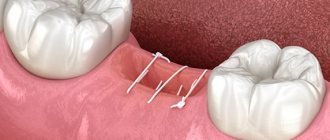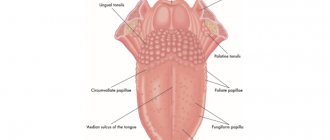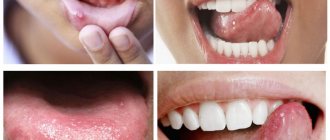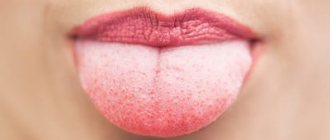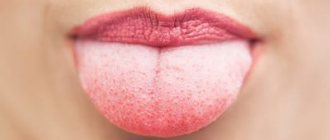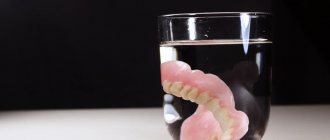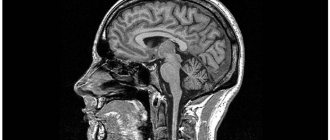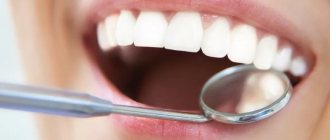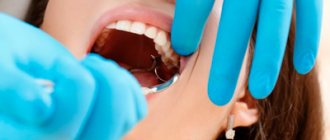Author of the article:
Soldatova Lyudmila Nikolaevna
Candidate of Medical Sciences, Professor of the Department of Clinical Dentistry of the St. Petersburg Medical and Social Institute, Chief Physician of the Alfa-Dent Dental Clinic, St. Petersburg
The taste of blood in the mouth is quite common. However, this symptom should never be ignored. Of course, the reasons for its appearance can be quite harmless, for example, a slight injury to the gums or eating food from clay dishes. However, an unpleasant taste can also indicate very dangerous pathologies. Let's figure out why a metallic taste may appear in the mouth and what to do to eliminate it as soon as possible, and most importantly, remove the reasons for its appearance.
Conventionally, all the causes of a pronounced metallic taste can be divided into three groups:
- Dental problems are usually associated with increased bleeding of the gums.
- Oral injuries.
- Internal pathologies.
Taking various medications often leads to a taste of blood in the mouth.
Oral injuries
If the mucous membrane is damaged, a little blood may enter the taste buds and, accordingly, a metallic taste appears in the mouth.
The causes of mucosal injury may be:
- tartar in the mouth;
- improper dental care, for example, using a brush that is too hard;
- incorrectly installed dentures;
- incorrectly installed braces.
Often the cause of the taste of blood in the mouth is a more significant injury, such as to the esophagus or throat. For example, a strong cough often leads to mucosal injuries. After an injury, a small amount of blood enters the mouth and causes an unpleasant taste.
What happens to blood circulation during exercise?
As soon as the body’s activity increases, part of the plasma from the blood leaves the blood vessels to fill the intercellular space of the working muscles, of which the maximum number is used when running. The volume of circulating blood decreases.
But tissues need increased doses of oxygen, water and nutrition, as well as accelerated removal of waste products. Therefore, the heart is forced to work harder, trying to pump as much blood as possible.
Prolonged load leads to heat loss. Therefore, the blood flow to the muscles gradually decreases. The body shunts blood to the skin to compensate for lost heat.
Muscles actively lose nutritional reserves (glucose), but produce more lactic acid , the accumulation of which leads to an imbalance in the acid-base balance.
The body successfully neutralizes and equalizes all these consequences of accelerated metabolism if the athlete follows the rules:
- training is carried out regularly, and the load is increased gradually;
- the body receives a sufficient amount of water and glucose;
- the athlete closely monitors his well-being and promptly responds to the signs that the body gives during a run.
People with pathologies of the cardiovascular system, excess weight and insufficient training should be especially careful about their health if they decide to include running in a complex of health-improving activities.
Thus, when running, the circulatory system undergoes complex physiological and chemical changes. If the loads correspond to the athlete’s state of health, then the heart gradually becomes more resilient, the blood vessels are more elastic, swelling and congestion disappear from the tissues, and blood pressure normalizes.
Internal pathologies
The most common diseases of internal organs that lead to the taste of blood in the mouth include:
- bronchitis;
- pneumonia (pneumonia);
- lung abscess;
- lungs' cancer;
- cystic fibrosis;
- tuberculosis;
- dysfunction of the heart;
- disruption of the gastrointestinal tract (GIT);
- diseases of the ENT organs.
Neurological diseases can also cause the taste of blood in the mouth. A signal travels through the nerve fibers of the brain to the taste buds; if its transmission is disrupted, an unusual taste may appear in the mouth.
However, neurological problems accompanied by a blood taste usually have other unpleasant manifestations. For example, they may be accompanied by headaches, hearing problems, hand tremors, trembling eyelids, and lumbago in certain areas of the face.
In very rare cases, the taste of blood in the mouth is caused by heavy metal poisoning. A similar problem often awaits workers in chemical laboratories and metal processing plants. Intoxication of the body is accompanied by other unpleasant symptoms - attacks of dry cough, nausea, aching limbs, swelling of the gums, and lack of appetite. Dysbacteriosis is also rarely the cause.
Circulatory system disorders
Often athletes note suspicious phenomena in the body associated with blood. Not all of them indicate the presence of serious diseases, but they definitely require close attention.
Where does the taste of blood come from in your mouth when running?
A metallic taste in the mouth occurs due to:
- Blood in the mouth after running, at best, appears from minor injuries to the mucous membranes of the tongue or oral cavity.
- Dental problems – stomatitis, periodontal disease or gingivitis.
- When you have a nosebleed, blood particles can get into your throat and then into your mouth.
- Inflammatory processes in the trachea and larynx - laryngitis, pharyngitis, tracheitis, bronchitis, tumor.
- Lung diseases (pneumonia, tuberculosis, tumors).
- Pathologies of the gastrointestinal tract - ulcers, tumors, erosion of the mucous membranes of the digestive canal, cirrhosis of the liver, and so on.
- Cardiovascular disorders. Angina attacks are often accompanied by a metallic taste in the mouth. And hypertension is characterized by capillary fragility, especially during physical activity.
- Heavy metal poisoning.
When stressed on inflamed tissues, capillaries are easily destroyed, saliva or mucus takes on a pink (red) tint, and red streaks appear. Coughing or harsh breathing causes secretions to enter the mouth from the nose, throat and lungs.
In these cases, you should stop jogging and then immediately consult a doctor.
Blood clotting during exercise
Whether running and other activities thin the blood is a controversial question.
If a person has blood clotting pathologies, then stress will aggravate them. However, 20-30 minutes of jogging at a speed of 6-10 km/h (after permission from a doctor) is often included in a complex of health-improving activities.
According to statistics, the threat of thrombocytosis develops more often in the morning. But evening jogging has a different effect on blood viscosity. Moreover, lovers of morning workouts have an increased risk of having a heart attack or stroke in the next 10-15 years.
In a healthy person, muscle tension simultaneously enhances the work of both the coagulation and anticoagulation systems. In the first case, the number of platelets increases, and a number of processes take place aimed at reducing bleeding time.
Next, the anticoagulant system is activated to prevent the formation of blood clots in the vessels. Both systems balance each other to eliminate the risk of negative consequences in the form of bleeding, blood clots, heart attacks, and strokes.
Should cause alarm
phenomena after a run such as drowsiness and fatigue, as well as frequent drops in blood pressure during the day
Bloody discharge after jogging
In women, blood appears after running for natural reasons, if the runner is expecting her menstrual period, forgot to take a hormonal contraceptive, or it is time for ovulation. At the same time, the blood volume is small, the odor is neutral, there are no clots or pain.
In other cases, discharge indicates pathology:
- myoma;
- ovarian cyst;
- malignant tumor;
- cervical erosion;
- endometritis;
- prolapse of the intrauterine device;
- venereal infection.
A visit to the doctor will help identify the disease at an early stage.
Blood in urine after running
This phenomenon is sometimes observed in healthy people after heavy exercise, such as a marathon .
But more often it is a symptom of a dangerous disease:
- tumors of the kidneys, bladder;
- urolithiasis disease;
- inflammation (cystitis, pyelonephritis);
- unhealed wounds after surgical intervention in the genitourinary system.
Blood in urine is not always visible visually. In diseases of the kidneys or pelvic organs, tests often show hidden blood, that is, red blood cells or hemoglobin are detected.
Nosebleeds
A single case of bleeding from the nose can be explained by short-term malaise, overheating, or a change in pressure. But if such cases occur regularly, this is a reason to go to the doctor.
Causes of bleeding:
- arterial hypertension;
- bad habits that lead to thinning of capillaries - smoking, alcohol;
- diseases leading to changes in the vascular system - hypertension, atherosclerosis, vitamin deficiency; hypovitaminosis, sepsis, heart disease and others;
- blood diseases - anemia, hemophilia and others;
- infectious or viral diseases - influenza, smallpox, malaria, scarlet fever and so on.
If there is bleeding, you should sit down, tilt your head back and apply cold to the bridge of your nose. And visit an ENT doctor as soon as possible.
Dental diseases
The most common cause of the taste of blood in the mouth remains dental diseases and lip lesions. Diseases are easily recognized by reddish-colored saliva, inflamed oral mucosa, and the presence of ulcers and erosions.
The main dental problems that cause the taste of blood in the mouth are:
- gingivitis - inflammation of the gums;
- stomatitis - damage to the mucous membranes;
- cheilitis - lip injuries;
- periodontitis is inflammation of the periodontal tissues.
Blood and circulation
Blood is a type of connective tissue that continuously circulates in one direction in a closed circle - the circulatory system.
The structure of this system includes:
- Numerous vessels (arteries, veins, capillaries).
- The heart continuously and rhythmically pumps blood.
Arterial blood enriched with oxygen enters the body from the heart. The venous system returns back, having collected carbon dioxide from the tissues.
metabolism accelerates sharply , and the body strives with all its might to maintain the usual balance of processes. And here the relationship between running and blood comes to the fore.
What to do if you taste blood in your mouth?
First, you should contact your dentist. The doctor will confirm or deny dental diseases, prescribe effective gum treatment or refer you to another specialist.
If the taste of blood in the mouth appears for a short time, you can eliminate it using traditional methods of treatment. For example, rinse your mouth with water and lemon juice or a water-salt solution. You can also get rid of the unpleasant taste using a chamomile solution. To prepare it, you need to pour 5 g of dried flowers into 500 ml of water and cook for 7-10 minutes in an enamel bowl. The product must be infused for an hour.
A decoction of oak bark will also help get rid of the taste of blood in your mouth. To prepare it, 10 grams of raw material should be steamed with boiling water and left for about an hour.
An effective means of treating gum inflammation and eliminating such unpleasant symptoms as the taste of blood in the mouth is ASEPTA Active mouth rinse. This combined action remedy is used for infectious and inflammatory diseases of the oral cavity, and also quickly relieves bleeding and inflammation of the gums. The rinse has an antimicrobial, anti-inflammatory and analgesic effect, does not contain alcohol, fluorine and dyes, so it is perfect for treating even those with the most sensitive tissues.
What should you do if you have a bloody taste after running?
For physiological reasons, no treatment is required!
Mouth injuries should be rinsed and treated with healing and disinfecting solutions, and protected from hot and spicy foods. To do this, consult your dentist.
But if you have other symptoms: fever, cough, nausea, abdominal pain, frequent bleeding - be sure to consult a doctor for a full examination!
In addition to the listed diseases, the following are possible: vitamin deficiency, metal poisoning, tumors. Take care of your health!
Clinical researches
The effectiveness of various ASEPTA mouth rinses has been repeatedly proven clinically.
For example, it has been clinically proven that the two-component mouth rinse ASEPTA ACTIVE more effectively combats the causes of inflammation and bleeding compared to single-component rinses - it reduces inflammation by 41% and reduces bleeding gums by 43%.
Sources:
- The role of anti-inflammatory rinse in the treatment of periodontal diseases (L.Yu. Orekhova, A.A. Leontyev, S.B. Ulitovsky) L.Yu. OREKHOVA, Doctor of Medical Sciences, Prof., Head of Department; A.A. LEONTIEV, dentist; S.B. ULITOVSKY, Doctor of Medical Sciences, Prof. Department of Therapeutic Dentistry of St. Petersburg State Medical University named after. acad. I. P. Pavlova
- The effectiveness of the use of Asept “adhesive balm” and Asept “gel with propolis” in the treatment of chronic generalized periodontitis and gingivitis in the acute stage (Municipal Dental Clinic No. 4, Bryansk, Kaminskaya T. M. Head of the therapeutic department Kaminskaya Tatyana Mikhailovna MUZ City Dental Clinic No. 4, Bryansk
- The effectiveness of complex therapy in the treatment of periodontal diseases. (Department of Periodontology of the SF State Budgetary Educational Institution of Higher Professional Education MGMSUIM.A.I. Evdokimova. Moscow.) Nemeryuk D.A. - Associate Professor, Candidate of Medical Sciences, Dikinova B.S. - Postgraduate Student of the Department of Periodontology of the SF Tsargasova M.O. - Postgraduate Student of the Department periodontology SF Yashkova V.V. - postgraduate student of the Department of Periodontology of the SF Department of Periodontology of the SF State Budgetary Educational Institution of Higher Professional Education MGMSUIM.A.I.Evdokimova. Moscow
conclusions
Running will only be beneficial if the loads are selected individually and training is carried out regularly - 2-4 times a week. If a person has problems with the cardiovascular system, then additional monitoring of well-being with the help of medical tests is necessary.
Lekomtsev Denis Nikolaevich
Athlete - triathlete (
